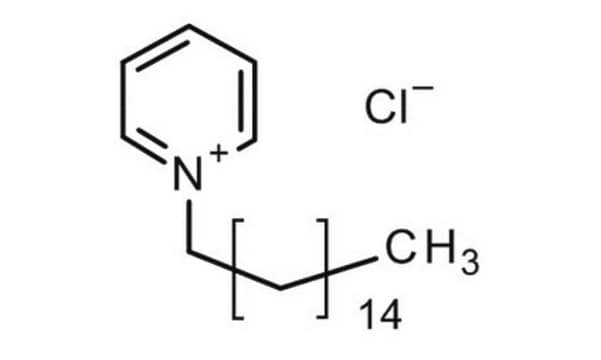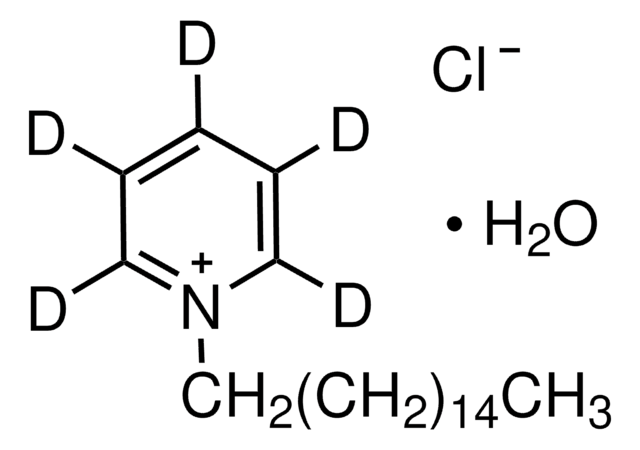C1000000
Cetylpyridinium chloride
European Pharmacopoeia (EP) Reference Standard
Sinónimos:
Cetylpyridinium chloride monohydrate, 1-Hexadecylpyridinium chloride, Hexadecylpyridinium chloride monohydrate
About This Item
Productos recomendados
grade
pharmaceutical primary standard
API family
cetylpyridinium
manufacturer/tradename
EDQM
mp
83-86 °C (lit.)
application(s)
pharmaceutical (small molecule)
format
neat
SMILES string
O.[Cl-].CCCCCCCCCCCCCCCC[n+]1ccccc1
InChI
1S/C21H38N.ClH.H2O/c1-2-3-4-5-6-7-8-9-10-11-12-13-14-16-19-22-20-17-15-18-21-22;;/h15,17-18,20-21H,2-14,16,19H2,1H3;1H;1H2/q+1;;/p-1
InChI key
NFCRBQADEGXVDL-UHFFFAOYSA-M
¿Está buscando productos similares? Visita Guía de comparación de productos
General description
Application
Packaging
Other Notes
related product
signalword
Danger
Hazard Classifications
Acute Tox. 2 Inhalation - Acute Tox. 4 Oral - Aquatic Acute 1 - Eye Dam. 1 - Skin Irrit. 2 - STOT SE 3
target_organs
Respiratory system
Storage Class
6.1A - Combustible acute toxic Cat. 1 and 2 / very toxic hazardous materials
wgk_germany
WGK 3
flash_point_f
Not applicable
flash_point_c
Not applicable
Elija entre una de las versiones más recientes:
Certificados de análisis (COA)
Lo sentimos, en este momento no disponemos de COAs para este producto en línea.
Si necesita más asistencia, póngase en contacto con Atención al cliente
¿Ya tiene este producto?
Encuentre la documentación para los productos que ha comprado recientemente en la Biblioteca de documentos.
Los clientes también vieron
Nuestro equipo de científicos tiene experiencia en todas las áreas de investigación: Ciencias de la vida, Ciencia de los materiales, Síntesis química, Cromatografía, Analítica y muchas otras.
Póngase en contacto con el Servicio técnico








